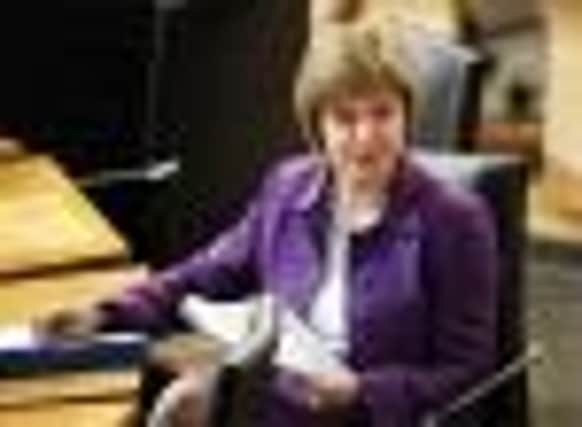‘Yes’ vote means more power, says Nicola Sturgeon


Writing in Scotland on Sunday, the Deputy First Minister says staying within the Union next year would put greater powers for Scotland at the bottom of the Westminster agenda and condemn Scots to years of navel-gazing and wondering “what if”.
Sturgeon argues that voting “Yes” is the only way more powers can be transferred to Holyrood.
Advertisement
Hide AdAdvertisement
Hide Ad“A ‘No’ vote is literally a vote for nothing – other than the continuation of a Westminster austerity agenda we didn’t vote for, uncertainty about our place in Europe, and complete certainty that Scotland would have a new generation of Trident nuclear weapons dumped on the Clyde for another 50 years,” Sturgeon writes.
“A ‘No’ vote would relegate Scotland to the bottom of the Westminster agenda – the idea that Holyrood would gain new powers in these circumstances is fanciful,” she adds.
With further devolutionary measures not included in the simple yes-no referendum in 2014 and the Better Together campaign yet to coalesce around a vision of enhanced devolution, Sturgeon’s strategy aims to capture voters who believe in more powers but are unconvinced by independence.
Such an approach, however, carries the risk that the strategy could be outflanked if Labour, the Lib Dems and the Tories join together prior to the vote to provide an alternative that proves more popular to the electorate. All three pro-UK parties have indicated they favour transferring more powers to Holyrood in the event of a “No” vote, but they have yet to articulate how that might work.
Sturgeon’s essay kicks off a Scotland on Sunday project called Scotland Decides, which will give each side of the independence debate four weeks of coverage within the paper in which to put their case to readers.
The Deputy First Minister’s remarks came after a poor week for the independence movement with the publication of a poll suggesting only 23 per cent of Scots believe Scotland should split from the UK.
Sturgeon, however, is hoping to win a significantly larger group, identified by the same ScotCen Social Research poll, who in more general terms think Scotland should take all its own decisions, or at least all its decisions apart from defence and foreign affairs.
The poll, which indicated that support for independence was at a 13-year low, has also led to discontent about the running of the YesScotland campaign, with SNP activists on the ground complaining of a lack of direction. Although meetings have seen a healthy turn-out of highly motivated supporters, they say, an apparent lack of organisation has meant that they have been left without instructions on how to move the campaign forward.
Advertisement
Hide AdAdvertisement
Hide Ad“The officer classes have come along to various events, which has been great, but there has been no follow- through,” said one activist. “There does seem to be a lack of direction. The perception is that it is a bit flat.”
Margo MacDonald, the former SNP deputy leader and veteran independence campaigner, said: “At times I have thought it has looked amateurish in comparison with the unit that’s being assembled in London.”
But speaking to Scotland on Sunday, Yes Scotland’s chief executive, Blair Jenkins, said that despite the gloomy poll findings there was no cause for panic. Asked if the poll findings meant it was time to “press the panic button”, the former head of news at BBC Scotland said: “One of the great things about having run television news for so long is that I never ever panic. That’s one thing I never ever do. And there is no case for doing that at all with this campaign.”
Jenkins was speaking in advance of another crucial week in the battle for Scotland’s future. A deal on the vital wording of the question that voters will be asked in the referendum is expected to be agreed this week following scrutiny of the SNP government’s preferred option by the Electoral Commission. The SNP proposed the question should be, “Do you agree that Scotland should be an independent country?” However, the Better Together campaign claimed it was “skewed” on the grounds it invites consent from people.
Jenkins indicated he would back the Commission’s advice on the question and would accept its verdict on spending limits for the campaigns, political parties and other bodies involved in the run-up to the vote.
Jenkins’s comments appear at odds with the view previously expressed by SNP leader Alex Salmond, who has insisted Holyrood should be the final arbiter, rather than the Electoral Commission.
But Jenkins said: “It is true to say it is an advisory body. However, everyone’s experience of the Electoral Commission is that they are an extremely expert and professional body and if they propose any changes to the question proposed by the Scottish Government then I am sure they will provide extremely good evidence for why it needs to change and at that point I think it would be difficult to argue against that.”
Yesterday, Sturgeon wrote to all EU foreign ministers reassuring them that an independent Scotland had “no intention” of leaving the EU. Labour MSP Patricia Ferguson said: “Nicola Sturgeon can write all the letters she wants, but none of this can hide the fact that a separate Scotland would need to apply to join the EU.”